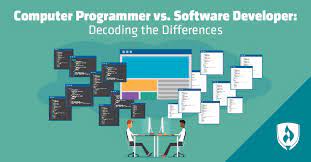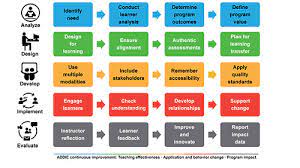The Role of a Junior Programmer in the Tech Industry
In the fast-paced world of technology, junior programmers play a crucial role in the development and maintenance of software applications. These entry-level professionals are typically recent graduates or individuals with limited experience in programming.
Junior programmers work under the guidance of senior developers and team leads to learn the ropes of coding, debugging, and testing software. They are responsible for writing code, troubleshooting issues, and collaborating with other members of the development team to deliver high-quality products.
One of the key responsibilities of a junior programmer is to continuously improve their skills and stay updated on the latest programming languages, tools, and technologies. They often participate in training programs and workshops to enhance their knowledge and expertise.
While junior programmers may not have as much experience as their senior counterparts, they bring fresh perspectives and innovative ideas to the table. Their enthusiasm and willingness to learn make them valuable assets to any tech team.
As they gain more experience and proficiency in programming, junior programmers have the opportunity to advance their careers and take on more challenging roles within the tech industry. With dedication and hard work, they can climb the ranks from junior programmer to senior developer or even tech lead.
In conclusion, junior programmers play a vital role in driving innovation and progress in the tech industry. Their passion for coding and commitment to continuous learning make them an integral part of any software development team.
Seven Key Advantages of Hiring a Junior Programmer: Innovation, Adaptability, and Growth Potential
- Brings fresh perspectives and innovative ideas to the team.
- Enthusiastic and eager to learn new technologies.
- Can adapt quickly to changing project requirements.
- Works well in a collaborative team environment.
- Helps bridge the gap between theoretical knowledge and practical application.
- Contributes to a diverse range of projects, gaining valuable experience.
- Has the potential for rapid career growth with dedication and hard work.
Six Challenges Associated with Hiring Junior Programmers: From Development Delays to Communication Hurdles
- Limited experience may result in longer development time for tasks
- May require more supervision and guidance from senior developers
- Potential for making more coding errors due to lack of experience
- Less likely to contribute to complex or critical projects initially
- May struggle with understanding and implementing advanced programming concepts
- Could face challenges in effectively communicating technical ideas with team members
Brings fresh perspectives and innovative ideas to the team.
Junior programmers bring fresh perspectives and innovative ideas to the team, infusing new energy and creativity into projects. Their unique outlooks, often shaped by recent education and exposure to the latest technologies, can challenge conventional thinking and inspire novel solutions to complex problems. By encouraging diversity of thought and fostering a culture of innovation, junior programmers contribute valuable insights that can lead to breakthroughs in software development and drive continuous improvement within the team.
Enthusiastic and eager to learn new technologies.
Junior programmers bring a valuable pro to the table with their enthusiasm and eagerness to learn new technologies. Their passion for exploring and mastering cutting-edge tools and programming languages not only fuels their own professional growth but also injects fresh energy and innovative ideas into the development team. This proactive approach to continuous learning enables junior programmers to adapt quickly to evolving industry trends and contribute positively to the success of software projects.
Can adapt quickly to changing project requirements.
Junior programmers possess the valuable ability to adapt quickly to changing project requirements. Their flexibility and eagerness to learn enable them to pivot seamlessly when faced with new challenges or shifting priorities. This pro of junior programmers allows them to contribute effectively to the success of a project by responding promptly and efficiently to evolving needs, ultimately helping the team stay on track and achieve its goals.
Works well in a collaborative team environment.
Junior programmers excel in collaborative team environments, leveraging their enthusiasm and willingness to learn to contribute effectively to group projects. Their ability to communicate openly, share ideas, and actively engage with team members fosters a positive and productive work atmosphere. Junior programmers often bring fresh perspectives and innovative solutions to the table, enhancing the overall creativity and problem-solving capabilities of the team. By working well with others, junior programmers not only enhance their own skills but also contribute significantly to the success of the team as a whole.
Helps bridge the gap between theoretical knowledge and practical application.
Junior programmers play a crucial role in bridging the gap between theoretical knowledge acquired through education and its practical application in real-world scenarios. By applying their academic learning to hands-on coding projects, junior programmers gain valuable experience that helps them understand how concepts translate into actual software development. This practical experience not only enhances their skills but also prepares them for more complex challenges in the tech industry, ultimately contributing to their growth and success as professionals.
Contributes to a diverse range of projects, gaining valuable experience.
Junior programmers contribute to a diverse range of projects, which allows them to gain valuable experience in various aspects of software development. By working on different projects, they have the opportunity to learn new skills, tackle different challenges, and expand their knowledge base. This exposure to a variety of projects not only helps junior programmers build a strong foundation in programming but also enables them to adapt to different work environments and project requirements. Overall, the ability to contribute to diverse projects is a significant advantage for junior programmers as it enhances their skill set and prepares them for future career opportunities in the tech industry.
Has the potential for rapid career growth with dedication and hard work.
Junior programmers have the exciting opportunity for rapid career growth with dedication and hard work. By demonstrating a strong work ethic, a willingness to learn, and a proactive attitude towards their professional development, junior programmers can quickly advance within the tech industry. With each project they tackle and each skill they acquire, they pave the way for future opportunities to climb the career ladder from entry-level positions to more senior roles. The potential for rapid career growth is a motivating factor that drives junior programmers to excel in their roles and strive for success in the dynamic world of technology.
Limited experience may result in longer development time for tasks
Limited experience among junior programmers can lead to longer development times for tasks. Without the depth of knowledge and expertise that more seasoned developers possess, junior programmers may encounter challenges and roadblocks that require additional time to overcome. They may need guidance and support from senior team members, which can slow down the overall progress of a project. As they gain more experience and familiarity with different programming concepts and tools, junior programmers will become more efficient and effective in completing tasks within shorter timeframes.
May require more supervision and guidance from senior developers
One notable con of being a junior programmer is the potential need for increased supervision and guidance from senior developers. Due to their limited experience and knowledge in the field, junior programmers may rely heavily on senior team members for mentorship and direction. This dependency on senior developers can sometimes slow down the development process and create additional workload for experienced team members. Junior programmers must actively seek opportunities to enhance their skills and knowledge independently to reduce their reliance on constant supervision, allowing them to contribute more effectively to the team.
Potential for making more coding errors due to lack of experience
One significant drawback of being a junior programmer is the increased potential for making coding errors due to a lack of experience. Junior programmers may not have encountered as many complex coding scenarios or debugging challenges as their more experienced counterparts, which can lead to mistakes in their code. These errors can result in inefficiencies, bugs, and delays in the development process, requiring additional time and effort to rectify. However, with proper guidance, mentorship, and continued learning opportunities, junior programmers can gradually improve their skills and minimize the occurrence of coding errors over time.
Less likely to contribute to complex or critical projects initially
Junior programmers are often faced with the con of being less likely to contribute to complex or critical projects initially. Due to their limited experience and skill level, they may be assigned more straightforward tasks or given less responsibility on high-stakes projects. This can be frustrating for junior programmers who are eager to prove themselves and take on challenging assignments. However, this limitation can also be viewed as an opportunity for them to learn and grow in a supportive environment before tackling more complex projects in the future.
May struggle with understanding and implementing advanced programming concepts
Junior programmers may face challenges when it comes to grasping and applying complex programming concepts. Due to their limited experience, they may find it difficult to understand intricate algorithms, data structures, or design patterns. This struggle can hinder their ability to write efficient and scalable code, leading to potential errors or inefficiencies in software development projects. However, with proper guidance and continuous learning, junior programmers can gradually overcome these obstacles and enhance their skills in advanced programming concepts.
Could face challenges in effectively communicating technical ideas with team members
Junior programmers could face challenges in effectively communicating technical ideas with team members due to their limited experience and knowledge in the field. As they are still learning the intricacies of programming languages and software development processes, articulating complex technical concepts in a clear and concise manner can be daunting. This lack of communication skills may lead to misunderstandings within the team, delays in project timelines, and potential errors in code implementation. Junior programmers must actively work on improving their communication abilities through practice, seeking feedback, and engaging in collaborative efforts to bridge this gap and ensure effective teamwork within the development environment.




